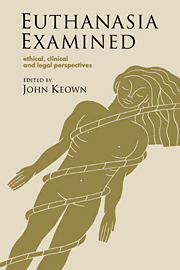Book contents
- Frontmatter
- Contents
- List of contributors
- Acknowledgements
- Foreword by Daniel Callahan
- Introduction
- 1 Euthanasia and the value of life
- 2 A philosophical case against euthanasia
- 3 The philosophical case against the philosophical case against euthanasia
- 4 The fragile case for euthanasia: a reply to John Harris
- 5 Final thoughts on final acts
- 6 Misunderstanding the case against euthanasia: response to Harris's first reply
- 7 Euthanasia: back to the future
- 8 The case for legalising voluntary euthanasia
- 9 Extracts from the Report of the House of Lords Select Committee on Medical Ethics
- 10 Walton, Davies, Boyd and the legalization of euthanasia
- 11 Where there is hope, there is life: a view from the hospice
- 12 Letting vegetative patients die
- 13 A case for sometimes tube-feeding patients in persistent vegetative state
- 14 Dilemmas at life's end: a comparative legal perspective
- 15 Physician-assisted suicide: the last bridge to active voluntary euthanasia
- 16 Euthanasia in the Netherlands: sliding down the slippery slope?
- 17 Advance directives: a legal and ethical analysis
- 18 Theological aspects of euthanasia
- Index
5 - Final thoughts on final acts
Published online by Cambridge University Press: 03 May 2010
- Frontmatter
- Contents
- List of contributors
- Acknowledgements
- Foreword by Daniel Callahan
- Introduction
- 1 Euthanasia and the value of life
- 2 A philosophical case against euthanasia
- 3 The philosophical case against the philosophical case against euthanasia
- 4 The fragile case for euthanasia: a reply to John Harris
- 5 Final thoughts on final acts
- 6 Misunderstanding the case against euthanasia: response to Harris's first reply
- 7 Euthanasia: back to the future
- 8 The case for legalising voluntary euthanasia
- 9 Extracts from the Report of the House of Lords Select Committee on Medical Ethics
- 10 Walton, Davies, Boyd and the legalization of euthanasia
- 11 Where there is hope, there is life: a view from the hospice
- 12 Letting vegetative patients die
- 13 A case for sometimes tube-feeding patients in persistent vegetative state
- 14 Dilemmas at life's end: a comparative legal perspective
- 15 Physician-assisted suicide: the last bridge to active voluntary euthanasia
- 16 Euthanasia in the Netherlands: sliding down the slippery slope?
- 17 Advance directives: a legal and ethical analysis
- 18 Theological aspects of euthanasia
- Index
Summary
The tone of Finnis's contribution to these exchanges about the ethics of euthanasia has two noteworthy features. The first is his penchant for attesting to the truth of his own assertions. His response to my first essay does this in the very title and repeatedly thereafter; his own first contribution, perhaps following Sidgwick, also repeatedly purports to confirm the truth of its own claims. In one orgy of self–endorsement, within the space of fourteen lines, he describes his own claims, directly or obliquely, as ‘sound’ (twice), ‘common sense’ (twice) and once each as ‘true’, ‘exact philosophy’, ‘proper description’, ‘clear and realistic analysis’, ‘primary and proper description’, ‘straightforward, non–artificial’ and ‘substantive’. If only saying so could make it so!
The second is his apparent willingness to attribute the most discreditable of motives to those with whom he disagrees. When he concludes his second essay (Chapter 4) by asserting: ‘This debauching of our language by Harris is most readily explicable as intended to soften up his readers to support wide programmes of deliberate, intentional killing’, he is using the language of the holocaust. To invoke such an image to suggest that I am attempting to incite the commission of mass murder is, to put it as mildly as I can, unworthy. The passage to which Finnis refers explicitly argues against the killing of people who have not consented to die.
- Type
- Chapter
- Information
- Euthanasia ExaminedEthical, Clinical and Legal Perspectives, pp. 56 - 61Publisher: Cambridge University PressPrint publication year: 1995
- 1
- Cited by



